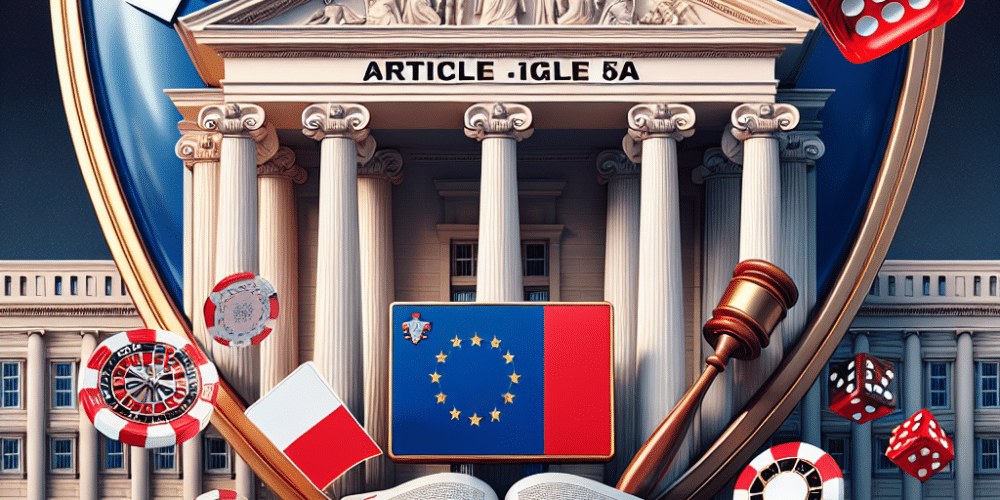In Luxembourg, the European Court of Justice’s Advocate General, Anthony Michael Emiliou, has delivered a pivotal opinion regarding Malta’s Article 56A, stirring the waters for igaming operators who hold licenses in Malta. Emiliou’s role is to provide objective legal perspectives on ongoing cases, and his latest opinion suggests that Article 56A might not shield operators from cross-border legal actions, particularly concerning the freezing of assets within the European Union.
This legal insight arises from the case involving Mr Green, operated by Evoke, which faced legal action in Austria. An Austrian gambler reported losing €62,878 while engaging with Mr Green’s services between January 2017 and April 2019. The Austrian courts ruled in favor of the plaintiff, affirming that the gambling contract violated Austrian law and mandating Mr Green to refund the losses along with interest and legal fees. Although Mr Green operates under a Maltese license, the case highlights the cross-border legal challenges that igaming operators could face, irrespective of Malta’s protective legislation.
The crux of the matter involves the European Account Preservation Order (EAPO) sought by the Austrian player to secure Mr Green’s assets across various EU nations, including Ireland, Sweden, Luxembourg, and Malta. Initially, the Austrian court hesitated, citing no immediate necessity for the order. However, the pressing question remained: would Malta’s Article 56A, designed to protect Maltese licensees from foreign legal interventions, obstruct such enforcement actions?
Advocate General Emiliou’s opinion indicates that Article 56A does not grant absolute immunity to Maltese-licensed operators from judgments in other EU countries. His analysis points to potential weaknesses in the legislation, suggesting that it could inadvertently encourage operators to dissipate assets or evade compliance with freezing orders. In essence, the Advocate General is signaling that Malta-licensed operators do not enjoy blanket protection from transnational legal responsibilities, particularly concerning asset preservation and player compensation claims.
Recent positions by the European Commission echo Emiliou’s sentiments, critiquing Article 56A for not providing all-encompassing protection. This scrutiny aligns with broader EU principles aimed at ensuring legal coherence and enforceability across member states. The Commission’s concerns revolve around the potential for Article 56A to create a jurisdictional loophole, undermining the mutual recognition of court decisions within the EU.
Yet, there’s another angle to consider. Proponents of Article 56A argue that Malta’s legislation is crucial in maintaining the island’s status as a leading hub for igaming businesses. The Maltese government has long advocated for the autonomy of its regulatory regime, emphasizing its capacity to uphold high standards of fairness and responsibility within the sector. From this perspective, Article 56A is seen not as a shield against rightful claims but as a necessary measure to prevent frivolous or disproportionate legal attacks against its licensees.
However, the ongoing discourse suggests a balancing act is required. “Operators need clarity and certainty about their obligations and rights across borders,” the industry remarks often echo. The implications of Emiliou’s opinion could prompt Malta to revisit its legislative framework to better align with EU-wide legal norms while safeguarding its economic interests.
As the debate unfolds, the European Court of Justice’s final ruling on the matter remains awaited. While the Advocate General’s opinion is influential, it is not binding. The court’s eventual verdict will ultimately determine the trajectory of Malta’s gaming legislation and its impact on cross-border enforcement within the EU.
In the meantime, igaming operators licensed in Malta may need to brace for potential adjustments in their legal strategy. They might reconsider asset management practices and compliance protocols to mitigate risks associated with cross-border judgments. This shift could also mean engaging more actively with EU-wide regulatory developments, ensuring that operators can swiftly adapt to any changes in the legal landscape.
From a broader industry perspective, this case underscores the tension between national legislative authority and the overarching EU legal framework. As the igaming sector continues to expand and evolve, the need for harmonized regulations that facilitate cross-border cooperation while respecting member states’ sovereignty becomes increasingly apparent.
Ultimately, the outcome of this legal challenge could set a precedent with far-reaching implications for the igaming industry in Europe. It highlights the delicate balance between national regulations and EU-wide legal consistency, a balance that is crucial for fostering a competitive yet fair gaming environment across the continent. As such, stakeholders across the industry will be watching closely, aware that the court’s decision could reshape the regulatory landscape in significant ways.

David Garato is a luminary in gaming journalism, renowned for peeling back the curtain on the gaming world with his witty and insightful commentary. A decade into weaving stories from the pixelated edges of indie games to the expansive universes of AAA titles, David’s work is a thrilling blend of analysis and adventure. When not writing, he’s live-streaming, sharing his gaming exploits with an engaged and growing audience. David doesn’t just write about games; he lives them, making him a trusted guide in the gaming community.
















